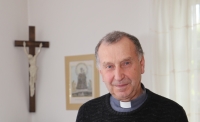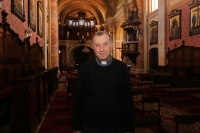A burnt down church like a person without God
Download image
František Sedláček was born on November 28, 1951 in Veselí nad Moravou in Slovácko. He grew up as the third of seven children in the family of father Jan and mother Marie, born Procházková, who belonged to one of the largest landlords in Veselí. In 1957, the parents, the grandfather and little František were struck by lightning in a field. All survived, but the mother suffered burns and both she and František’s father were unconscious. They took a long time to recover from the consequences of their injuries, and for some time neighbours helped them with the grunt. At the time of collectivization, the family farmed privately at first, but eventually succumbed to pressure from communist officials and the father became the chairman of the unified agricultural cooperative (JZD). For many years he then worked in various positions in cooperatives in Tasov, Nová Lhota or Sůchov. After graduating from elementary school in Veselí, František graduated from a three-year secondary general education school. In 1968, he participated in ministerial spiritual exercises, and in 1970 he applied to study at the priestly seminary in Litoměřice, where he studied, for example, with František Lízna. In 1974, during the funeral of Cardinal Štěpán Trochty, he managed to obtain photo documentation. He was ordained a priest the same year. His first work place was Přerov. As a result of intrigues and efforts to provoke a conflict coming from the local church secretary, František had to change places not even after a year. As he refused to join Pacem in terris, he was given a place at the rectory in the remote village of Tatenice (near Moravská Třebová) without electricity or water supply. He helped distribute Charter 77, but did not sign it himself. Since then, he had been under the surveillance of the StB almost continuously – his phone was tapped, he faced threats and hints of liquidation attempts, and he was often subjected to house searches and interrogations. There was also a futile attempt by the StB to recruit him to its services. From the end of the 1970s until 1990, he worked in Moravská Třebová, then in Vsetín. In 1981, the witness was formally condemned and immediately amnestied by President Gustáv Husák due to a fabricated case connected with the visit of believers - former natives of German nationality. He joined the Civic Forum during the Velvet Revolution. From 1998, he had been the leader of the seminary in Olomouc, and since 2005 he has been managing the pilgrimage site and the Church of the Nativity of Mary in Štípa, near Zlín.

